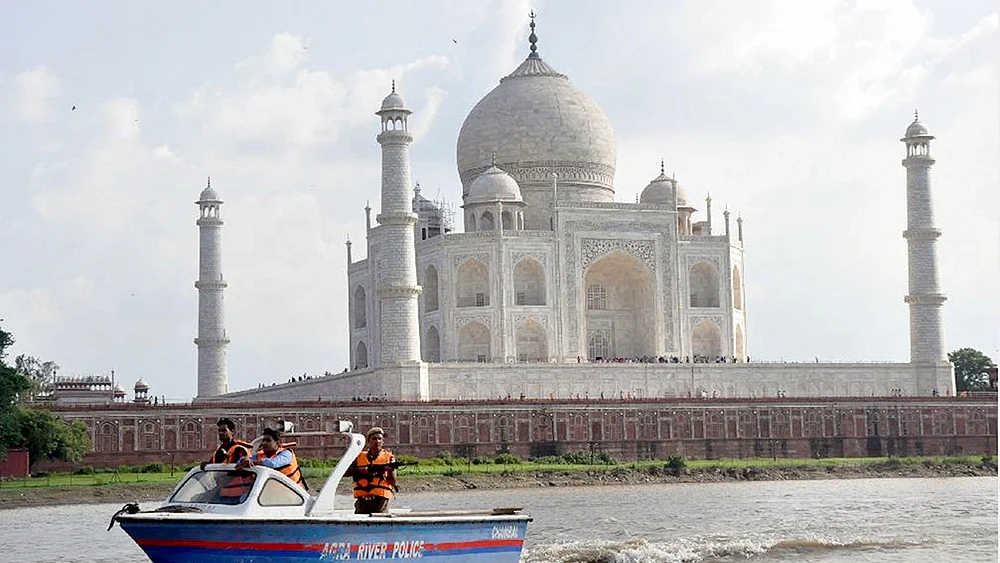Monkey attacks create panic among tourists at Taj Mahal in Agra
A scare has been sounded in Agra, Uttar Pradesh, after a series of simian attacks on unsuspecting tourists visiting the iconic Taj Mahal that draws close to eight million visitors annually

A scare has been sounded in Agra, Uttar Pradesh, after a series of attacks by monkeys on unsuspecting tourists visiting the iconic Taj Mahal that draws close to 8 million visitors annually. A group of tourists from Australia, said on Saturday, September 29 that they had been warned to be alert against simian, canine and bovine attacks in and around the Taj Mahal complex.
Tourists have been advised by guides to avoid lonely, romantic walks along narrow pathways, and to stay in groups to avoid monkey attacks.
The Central Industrial Security Force (CISF) personnel and the staffers of the Archaeological Survey of India (ASI), have no idea how to deal with the growing menace. “Cats, dogs, monkeys, bees, are proving to be big safety menace in the Taj premises,” said tourist guide Ved Gautam.
Alarmed by reports of a series of attacks on tourists, the Yogi Adityanath government is mulling a slew of measures to insulate the 17th century Mughal complex from marauding monkeys, that attack and snatch valuables from visitors. But when and how, no one knows.
- In August, a group of visitors from Indore was attacked by monkeys near the museum inside the Taj premises
- In April, a tourist from Chennai suffered a nasty dog bite, while an Israeli tourist was thrown down by a rampaging bull outside the eastern gate of the Taj
- Several French tourists were attacked by monkeys in June and July, some had to be dispatched to hospitals for treatment.
- In July, an Austrian tourist, Christina, was attacked by monkeys and had to be given treatment
An animal rights activist said: “Since the primates cannot be killed, they should be captured and released in the jungles. Birth control is also an answer. The monkeys have to be sterilised. But who will foot the bill?”
Plans in the past to contain the simian nuisance have fallen flat for want of implementation or a resources crunch.
Former Divisional Commissioner Pradip Bhatnagar had engaged an NGO, Wildlife SOS, to round up 10,000 monkeys, but the plan did not materialise due to lack of permission from appropriate authorities. "But now the situation is really alarming. Monkeys are seen in armies marching from one area to the other. The city has more than 50,000 monkeys.
“Due to the provisions of the Wildlife Act, the monkeys can not be attacked or rounded up without adequate safeguards and precautions. Plans to shift the monkeys to other areas have failed, as no district wants to shelter them,” said senior hotelier Surendra Sharma.
Monkey population exploding in Agra, Mathura, Vrindavan
Indeed, the state faces the biggest threat to peace in the form of exploding monkey population in Agra and neighbouring religious shrines in Mathura district and Vrindavan. Pilgrims are almost daily attacked in Vrindavan. "Usually the monkeys target spectacles or purses which are returned only when some eatables or cold drinks are offered to the monkeys."
Civic authorities seem helpless in tackling the menace. “We have written so many times to the municipal corporation, but there has been no action from their side,” said an ASI official.
When former President Pranab Mukherjee visited Vrindavan in November 2016, langurs had to be hired to shoo away the monkeys, recalled Jagan Nath Poddar, convener of Friends of Vrindavan. "Every shrine has dozens and dozens of the primates. For the pilgrims, negotiating their way through the lanes have always been difficult with cows and stray dogs everywhere. Now the simian menace has compounded it,” said Poddar.
Nandan Das, another Vrindavan resident, said: "Its a strange world, monkeys can attack humans, but we cannot kill or shoot them."
An animal rights activist said: "The monkeys should be taken out of the list of protected species in the Wild Life Act. Since the primates cannot be killed, they should be captured and released in the jungles. Birth control is an answer. The monkeys have to be sterilised. But who will foot the bill?"
Follow us on: Facebook, Twitter, Google News, Instagram
Join our official telegram channel (@nationalherald) and stay updated with the latest headlines